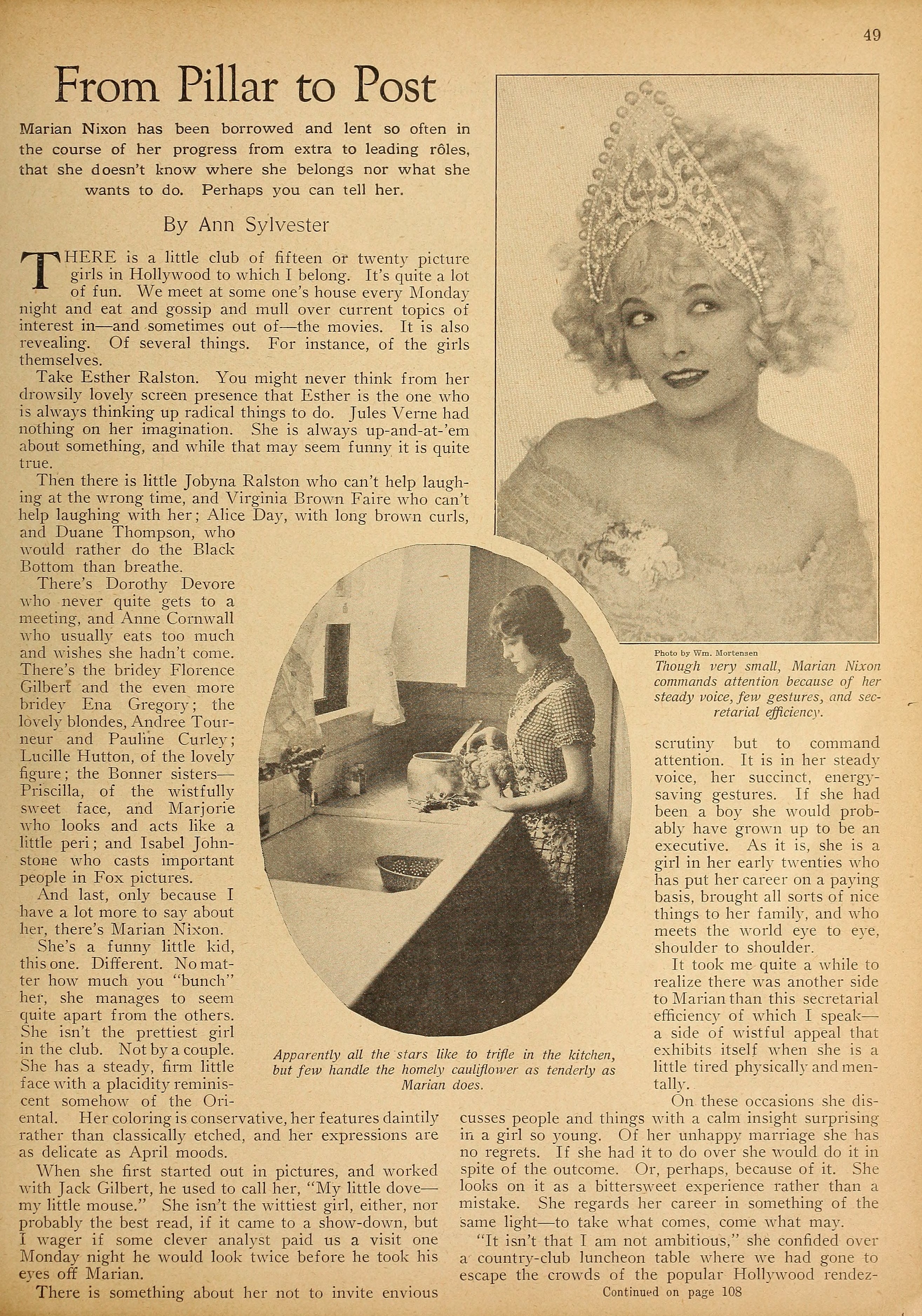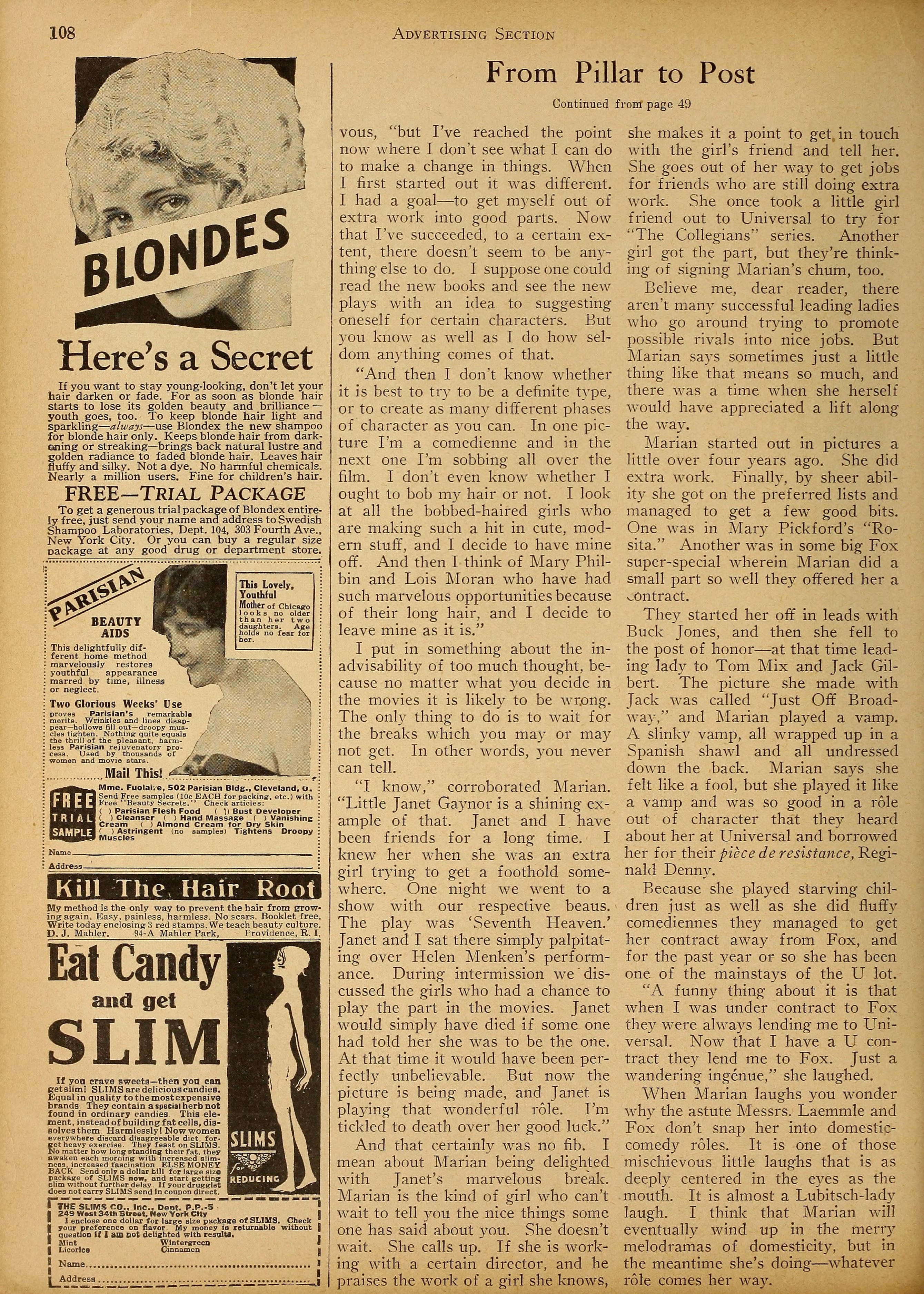Marian Nixon — From Pillar to Post (1927) 🇺🇸

There is a little club of fifteen or twenty picture girls in Hollywood to which I belong. It’s quite a lot of fun. We meet at some one’s house every Monday night and eat and gossip and mull over current topics of interest in — and sometimes out of — the movies. It is also revealing. Of several things. For instance, of the girls themselves.
by Ann Sylvester
Take Esther Ralston. You might never think from her drowsily lovely screen presence that Esther is the one who is always thinking up radical things to do. Jules Verne had nothing on her imagination. She is always up-and-at-’em about something, and while that may seem funny it is quite true.
Then there is little Jobyna Ralston who can’t help laughing at the wrong time, and Virginia Brown Faire who can’t help laughing with her; Alice Day, with long brown curls, and Duane Thompson, who would rather do the Black Bottom than breathe.
There’s Dorothy Devore who never quite gets to a meeting, and Anne Cornwall who usually eats too much and wishes she hadn’t come. There’s the bridey Florence Gilbert and the even more bridey Ena Gregory; the lovely blondes, Andrée Tourneur and Pauline Curley; Lucille Hutton, of the lovely figure; the Bonner sisters — Priscilla, of the wistfully sweet face, and Marjorie who looks and acts like a little peril and Isabel Johnstone who casts important people in Fox pictures.
And last, only because I have a lot more to say about her, there’s Marian Nixon.
She’s a funny little kid, this one. Different. No matter how much you “bunch” her, she manages to seem quite apart from the others. She isn’t the prettiest girl in the club. Not by a couple. She has a steady, firm little face with a placidity reminiscent somehow of the Oriental. Her coloring is conservative, her features daintily rather than classically etched, and her expressions are as delicate as April moods.
When she first started out in pictures, and worked with Jack Gilbert [John Gilbert], he used to call her, “My little dove — my little mouse.” She isn’t the wittiest girl, either, nor probably the best read, if it came to a show-down, but I wager if some clever analyst paid us a visit one Monday night he would look twice before he took his eyes off Marian.
There is something about her not to invite envious scrutiny but to command attention. It is in her steady voice, her succinct, energy-saving gestures. If she had been a boy she would probably have grown up to be an executive. As it is, she is a girl in her early twenties who has put her career on a paying basis, brought all sorts of nice things to her family, and who meets the world eye to eye, shoulder to shoulder.
It took me quite a while to realize there was another side to Marian than this secretarial efficiency of which I speak — a side of wistful appeal that exhibits itself when she is a little tired physically and mentally.
On these occasions she discusses people and things with a calm insight surprising in a girl so young. Of her unhappy marriage she has no regrets. If she had it to do over she would do it in spite of the outcome. Or, perhaps, because of it. She looks on it as a bittersweet experience rather than a mistake. She regards her career in something of the same light — to take what comes, come what may.
“It isn’t that I am not ambitious,” she confided over a country-club luncheon table where we had gone to escape the crowds of the popular Hollywood rendez-vous, “but I’ve reached the point now where I don’t see what I can do to make a change in things. When I first started out it was different. I had a goal — to get myself out of extra work into good parts. Now that I’ve succeeded, to a certain extent, there doesn’t seem to be anything else to do. I suppose one could read the new books and see the new plays with an idea to suggesting oneself for certain characters. But you know as well as I do how seldom anything comes of that.
“And then I don’t know whether it is best to try to be a definite type, or to create as many different phases of character as you can. In one picture I’m a comedienne and in the next one I’m sobbing all over the film. I don’t even know whether I ought to bob my hair or not. I look at all the bobbed-haired girls who are making such a hit in cute, modern stuff, and I decide to have mine off. And then I think of Mary Philbin and Lois Moran who have had such marvelous opportunities because of their long hair, and I decide to leave mine as it is.”
I put in something about the inadvisability of too much thought, because no matter what you decide in the movies it is likely to be wrong. The only thing to do is to wait for the breaks which you may or may not get. In other words, you never can tell.
“I know,” corroborated Marian. “Little Janet Gaynor is a shining example of that. Janet and I have been friends for a long time. I knew her when she was an extra girl trying to get a foothold somewhere. One night we went to a show with our respective beaus. The play was Seventh Heaven. Janet and I sat there simply palpitating over Helen Menken’s performance. During intermission we discussed the girls who had a chance to play the part in the movies. Janet would simply have died if some one had told her she was to be the one. At that time it would have been perfectly unbelievable. But now the picture is being made, and Janet is playing that wonderful role. I’m tickled to death over her good luck.”
And that certainly was no fib. I mean about Marian being delighted with Janet’s marvelous break. Marian is the kind of girl who can’t wait to tell you the nice things some one has said about you. She doesn’t wait. She calls up. If she is working with a certain director, and he praises the work of a girl she knows, she makes it a point to get, in touch with the girl’s friend and tell her. She goes out of her way to get jobs for friends who are still doing extra work. She once took a little girl friend out to Universal to try for The Collegians series. Another girl got the part, but they’re thinking of signing Marian’s chum, too.
Believe me, dear reader, there aren’t many successful leading ladies who go around trying to promote possible rivals into nice jobs. But Marian says sometimes just a little thing like that means so much, and there was a time when she herself would have appreciated a lift along the way.
Marian started out in pictures a little over four years ago. She did extra work. Finally, by sheer ability she got on the preferred lists and managed to get a few good bits. One was in Mary Pickford’s Rosita. Another was in some big Fox super-special wherein Marian did a small part so well they offered her a contract.
They started her off in leads with Buck Jones, and then she fell to the post of honor — at that time leading lady to Tom Mix and Jack Gilbert. The picture she made with Jack was called Just Off Broadway, and Marian played a vamp. A slinky vamp, all wrapped up in a Spanish shawl and all undressed down the back. Marian says she felt like a fool, but she played it like a vamp and was so good in a role out of character that they heard about her at Universal and borrowed her for their pièce de résistance, Reginald Denny.
Because she played starving children just as well as she did fluffy comediennes they managed to get her contract away from Fox, and for the past year or so she has been one of the mainstays of the U lot.
“A funny thing about it is that when I was under contract to Fox they were always lending me to Universal. Now that I have a U contract they lend me to Fox. Just a wandering ingénue,” she laughed.
When Marian laughs you wonder why the astute Messrs. Laemmle [Carl Laemmle] and Fox [William Fox] don’t snap her into domestic-comedy roles. It is one of those mischievous little laughs that is as deeply centered in the eyes as the mouth. It is almost a Lubitsch-lady laugh. I think that Marian will eventually wind up in the merry melodramas of domesticity, but in the meantime she’s doing — whatever role comes her way.

Though very small, Marian Nixon commands attention because of her steady voice, few gestures, and secretarial efficiency.
Apparently all the stars like to trifle in the kitchen, but few handle the homely cauliflower as tenderly as Marian does.

Collection: Picture Play Magazine, April 1927
